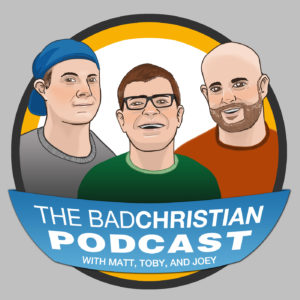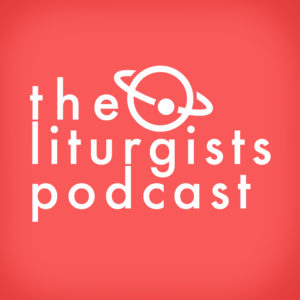Young Christians are leaving the church at incredibly high rates, often due to their engagement in social and societal concerns such as science and LGBTQ+ issues[1]. However, they may not be leaving to pursue agnosticism or atheism, but rather a space where they can challenge their understanding of the divine and question their theological upbringing, in a way that they feel they aren’t able to do in a traditional church setting.
 A community has spontaneously materialized to answer the needs of Christians seeking to do some uncensored, spiritual self-examination. Several podcasts hosted by Christians or “post-Christians” have been created to entertain thoughts and ideas from a variety of perspectives, and to talk about issues that aren’t normally addressed by pastors or other formal Christian leaders. The reason that these podcasts have seen such success, I believe, is because they provide a ministry that is often excluded in the modern evangelical church – these podcasts serve as “small groups” where taboo topics can be discussed, occasionally using language that you don’t hear at church.
A community has spontaneously materialized to answer the needs of Christians seeking to do some uncensored, spiritual self-examination. Several podcasts hosted by Christians or “post-Christians” have been created to entertain thoughts and ideas from a variety of perspectives, and to talk about issues that aren’t normally addressed by pastors or other formal Christian leaders. The reason that these podcasts have seen such success, I believe, is because they provide a ministry that is often excluded in the modern evangelical church – these podcasts serve as “small groups” where taboo topics can be discussed, occasionally using language that you don’t hear at church.
The Bad Christian podcast is hosted by members  of the band Emery, a post-hardcore band from Seattle that was popular in the early 2000s, especially among young Christians hungry to hear people of faith play the kind of music that seemed exclusive to the secular world. Though the hosts of this podcast are more or less traditional in their Christian beliefs (they affirm their belief in the death and resurrection of Jesus Christ, and question Rob Bell’s claims to be Christian after attending his ‘Everything is Spiritual Tour’), they use their show to discuss topics that are rarely examined in Christian circles, such as how to raise children with progressive Christian views, and the freedom they’ve found by exegeting Scripture outside of the ways they learned it as children.
of the band Emery, a post-hardcore band from Seattle that was popular in the early 2000s, especially among young Christians hungry to hear people of faith play the kind of music that seemed exclusive to the secular world. Though the hosts of this podcast are more or less traditional in their Christian beliefs (they affirm their belief in the death and resurrection of Jesus Christ, and question Rob Bell’s claims to be Christian after attending his ‘Everything is Spiritual Tour’), they use their show to discuss topics that are rarely examined in Christian circles, such as how to raise children with progressive Christian views, and the freedom they’ve found by exegeting Scripture outside of the ways they learned it as children.
“One of the biggest reasons that people are leaving the church,” the hosts of The Bad Christian podcast argue on Episode 292, “is because there is no room to approach the Bible differently.”
 The Liturgists podcast is hosted by Michael Gungor of the band Gungor (most popular for their song “Beautiful Things”) and Mike McHargue, who goes by the name ‘Science Mike’ due to his knowledge of biology, physics, and other scientific studies that enlighten conversations on the show. The Liturgists describe themselves as “a collective of artists and creators who create sacred art and experiences for the spiritually homeless and frustrated.” Their podcast addresses different themes on each episode, from topics such as “Black and White: Race in America,” to “Feminism,” to “LGBTQ+,” to “Suffering”. The early episodes of the podcast tell the stories of the two hosts and their journeys to where they are in their faith today. Both men grew up in the church and held important roles in their Christian community; Mike McHargue as a deacon at his Southern Baptist Church, and Michael Gungor as a worship leader in his charismatic Church and at youth conferences and mega-churches across the United States, as he toured with his wife in the band they founded. Both hosts experienced crises of faith that led them to explore atheism and live their lives apart from God and the churches they grew up in. Ultimately, both men returned to Christian doctrine, but gave themselves room to see God as more than their churches had taught them. Mike McHargue believes that becoming an atheist and then rediscovering God in a way that allows room for doubt has only made God more real to him.
The Liturgists podcast is hosted by Michael Gungor of the band Gungor (most popular for their song “Beautiful Things”) and Mike McHargue, who goes by the name ‘Science Mike’ due to his knowledge of biology, physics, and other scientific studies that enlighten conversations on the show. The Liturgists describe themselves as “a collective of artists and creators who create sacred art and experiences for the spiritually homeless and frustrated.” Their podcast addresses different themes on each episode, from topics such as “Black and White: Race in America,” to “Feminism,” to “LGBTQ+,” to “Suffering”. The early episodes of the podcast tell the stories of the two hosts and their journeys to where they are in their faith today. Both men grew up in the church and held important roles in their Christian community; Mike McHargue as a deacon at his Southern Baptist Church, and Michael Gungor as a worship leader in his charismatic Church and at youth conferences and mega-churches across the United States, as he toured with his wife in the band they founded. Both hosts experienced crises of faith that led them to explore atheism and live their lives apart from God and the churches they grew up in. Ultimately, both men returned to Christian doctrine, but gave themselves room to see God as more than their churches had taught them. Mike McHargue believes that becoming an atheist and then rediscovering God in a way that allows room for doubt has only made God more real to him.
“The opposite of faith,” says Mike McHargue on Episode 7 of The Liturgists, “is not doubt; it’s certainty … what need do the certain have for faith?” This podcast serves the uncertain by talking about the issues that cause uncertainty, and by looking for God in the unknowing.
Perhaps my favourite podc ast that questions beliefs is You Made It Weird hosted by comedian Pete Holmes, best known for his HBO show “Crashing” produced by comedy icon Judd Apatow (producer of Freaks and Geeks, Bridesmaids, Knocked Up). Before beginning his career in comedy, however, Pete grew up as your average mega-church youth group kid, and attended Gordon College, a Christian Liberal Arts school. He often recalls the times he led Bible Studies, and says that if he didn’t become a comedian, he would have become a youth pastor. Pete, like many Christians, married at a very young age – at age twenty-two he married someone he met at college because she was “the first person [he] slept with”. He was divorced at twenty-eight when his wife cheated on him, a topic he is open about on his show. Pete’s candidness and his personal format leads his podcast guests to discuss “comedy, sex, and God,” and allows them to delve into a variety of deep subjects that inform the audience about the guests’ overall outlook on life and faith.
ast that questions beliefs is You Made It Weird hosted by comedian Pete Holmes, best known for his HBO show “Crashing” produced by comedy icon Judd Apatow (producer of Freaks and Geeks, Bridesmaids, Knocked Up). Before beginning his career in comedy, however, Pete grew up as your average mega-church youth group kid, and attended Gordon College, a Christian Liberal Arts school. He often recalls the times he led Bible Studies, and says that if he didn’t become a comedian, he would have become a youth pastor. Pete, like many Christians, married at a very young age – at age twenty-two he married someone he met at college because she was “the first person [he] slept with”. He was divorced at twenty-eight when his wife cheated on him, a topic he is open about on his show. Pete’s candidness and his personal format leads his podcast guests to discuss “comedy, sex, and God,” and allows them to delve into a variety of deep subjects that inform the audience about the guests’ overall outlook on life and faith.
Though he is no longer the church-going Christian he once was, Pete Holmes is still deeply interested in spirituality and theology. On Episode 91 of the podcast (featuring comedian Thomas Middleditch) Pete points out that he is actually becoming “far more Christ-like now that I don’t associate with [the church]”, due to his life experiences in the secular world.
“When I was a full-blown believer, I would have pretended that I understood,” Pete goes on to say, but his experience of living as a comedian with comedian friends who are largely atheist has given him the skills to better empathize with and understand his fellow human beings.
Despite being primarily a comedy podcast, Pete has hosted a slew of spiritual teachers such as Rob Bell, Richard Rohr, Deepak Chopra, and Peter Rollins. Though Pete would not describe himself as a Christian, he does describe himself as “Christ-leaning” – and he references the person of Christ and many Bible stories to illustrate spiritual concepts. Though this podcast, unlike Bad Christians or the Liturgists, does not target post-Evangelicals as its primary audience, Pete’s past experience and empathy towards the spiritually confused makes it a safe space for those looking to contemplate or test their faith.
 These shows dare to draw attention to the ways in which the church is dysfunctional, and sometimes even limiting to spirituality. The hosts invite their listeners to explore their faith beyond what they might have been taught in Sunday school or youth group. Ultimately, these podcasts have provided a community where people are able to wrestle with their confusion without fear of judgement. They articulate that it is okay to experience loss, anger, bewilderment and doubt, thereby providing listeners with the hope of a faith that can grow and evolve.
These shows dare to draw attention to the ways in which the church is dysfunctional, and sometimes even limiting to spirituality. The hosts invite their listeners to explore their faith beyond what they might have been taught in Sunday school or youth group. Ultimately, these podcasts have provided a community where people are able to wrestle with their confusion without fear of judgement. They articulate that it is okay to experience loss, anger, bewilderment and doubt, thereby providing listeners with the hope of a faith that can grow and evolve.
[1] https://www.prri.org/spotlight/millennials-leave-their-churches-over-science-lesbian-gay-issues/







